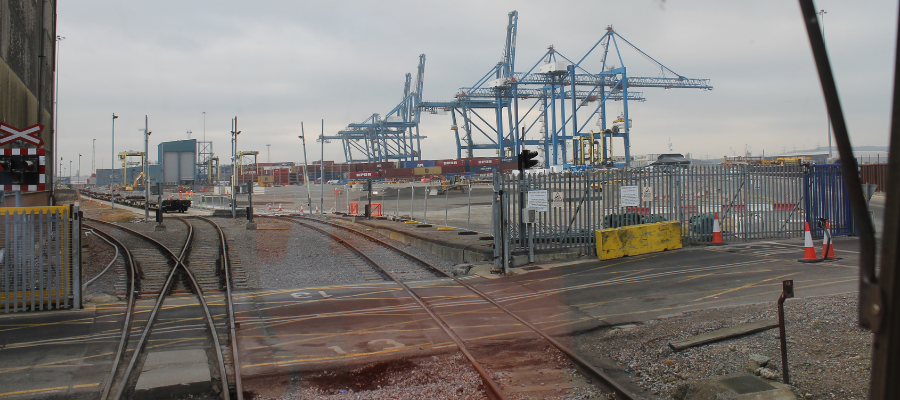🕒 Article read time: 4 minutes
Freeports present golden opportunity for rail freight

In last week’s Budget, the Chancellor announced plans to build eight Freeports across England, which is welcome news to many working in the logistics industry.
Freeports are secure customs zones located at maritime ports and airports where business can be carried out inside a country’s land border but where different customs rules apply. They promise to unlock new prospects for international trade, economic activity, innovation and efficiency. The sites hold the potential to maximise opportunities for rail freight too.
FREEPORTS
The Chancellor confirmed the eight sites chosen to become Freeports: East Midlands Airport, Felixstowe and Harwich, the Humber region, the Liverpool City Region, Plymouth, Solent, Thames and Teesside. Freeports can offer businesses relief from duties and import taxes, and ease tax and planning regulations, while reducing administrative burdens and tariff controls. Freeports may also offer simplifications to the normal customs administrative processes on imported goods.
The government intends for Freeports to be innovative hubs which boost global trade, attract inward investment and increase prosperity in the surrounding area by generating employment opportunities in some of the most deprived communities around the UK. It also wants businesses to use Freeports as an opportunity to generate and test new ideas and technologies across a range of sectors, including aviation, rail and maritime.
Zoe McLernon, Logistics UK’s Multimodal Policy Manager, said: “While Freeports are no miracle cure for economic malaise they could, in the view of Logistics UK, have a major role in economic restart and recovery.”
OPPORTUNITIES FOR RAIL FREIGHT
In its response to the government’s consultation on the proposal to establish Freeports across the UK, Logistics UK conveyed the importance of a multimodal approach.
McLernon said: “We are pleased to see rail is covered in many of the successful bids. For example, three of the winning bids – Felixstowe and Harwich, Thames, and Tilbury – have already committed to developing the rail offering at their sites, with Felixstowe the most noteworthy given Network Rail’s plans to improve facilities on the branch line serving the port. Furthermore, East Midlands Airport, as an inland Freeport, is well positioned to provide excellent multimodal opportunities for onward travel.”
However, many of the winning sites in the North of England – Liverpool and the Humber – have inadequate rail connectivity and improving this infrastructure must be a key focus for these ports. For these Freeports to be truly successful in attracting international trade and investment into the North of England, rail connections to and from the Freeports – as well as the traditional ports – must be efficient, fast, and readily available, something that is lacking in both the North East and North West. To rectify this, end-to-end freight paths must be improved on east-west routes to allow full access from west coast ports, such as Liverpool, and east coast ports on the Humber, Tees and Tyne. Lack of poor onward rail connectivity will dampen the economic impact of the successful bids in this region. Slow-running trains are another key infrastructure issue for this region.
“Logistics UK continues to campaign for improved north east and north west rail connectivity and service upgrades,” McLernon said, “aims which we are pleased to see are included in the Transport for the North’s Northern Powerhouse Rail (NPR), a £39 billion programme designed to deliver significant updates to the northern Rail Network.”
Across most of England, capacity on the network for rail freight movements is lacking and unless this is rectified, it will limit the opportunities for rail afforded by the Freeports. While High Speed 2 (HS2) presents a once-in-a-generation opportunity to unlock significant capacity on the network, the government and other stakeholders must provide a guarantee that there will be released capacity for rail freight as a result of the development. At present, there is no such assurance.
“Logistics UK will continue to campaign for access for freight movements so logistics businesses and their customers can benefit from the project,” McLernon said. “It is vital that HS2 is included in the development plans of any affected Freeport, and the government takes a holistic approach to rail capacity challenges.”
Logistics UK is also engaging with the Scottish government as it explores its options for Freeports – which they refer to as Green Ports – and is waiting to hear the devolved government’s intentions for Freeports in Wales and Northern Ireland.
McLernon said: “With rail set to play a much larger role in logistics as the UK transitions to a net-zero emission economy, rail must be considered an integral part in any Freeport development plan. Freeports have the potential to unlock new opportunities to grow multimodal activity and we will be working with government and other stakeholders to ensure use of rail freight is maximised.”
*www.logistics.org.uk/rail
Published On: 11/03/2021 17:00:35

Comments Section
If you are a Logistics UK member login to add comments.